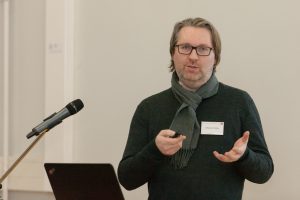Technische Universität Berlin | Telekom Innovation Laboratories
Telecommunication Systems Service-centric Networking (SNET)
Download Presentation: 31-PARADISE – Privacy-enhancing Technologies in a Doping Control Use-Case_Prof_Mund
PARADISE is a multidisciplinary project that seeks to promote and guarantee the overall privacy, security, and usability of the anti-doping coordination platform. At the same time, the PARADISE system also aims to improve the quality of doping controls while retaining their reliability and unpredictability. Back in 2012, Jonas Plass —former 400m runner and German national track and field team member— came up with the notion of developing an additional system that utilized location-based services- called »eves« to complement the already existing »ADAMS«. Mr. Plass and Dr. Denis Giffeler (gekko mbH) thus designed a fully detailed concept, which would lead them to set up a research project comprising expertise from a wide array of backgrounds. Working alongside firms and institutions such as Fraunhofer Gesellschaft’s institutes FIT and AISEC, Technical University Berlin, the Independent Centre for Privacy, Schleswig Holstein, and Uniscon GmbH, they expanded the original idea developing a prototype which integrates »eves« as a capability that athletes can voluntarily utilize. In 2016, PARADISE was granted funding by the German government within a Data Privacy Call of the Ministry of Education and Research to further develop their project. Hence, the key topics PARADISE addresses are control quality, data privacy, usability and security. In sum, PARADISE addresses some of the main criticism made about the current control system and improves athletes’ acceptance. To begin with, athletes carry a GPS and GSM-equipped wearable (the device called »eves«). Once a DCO has received a control order for an athlete, the DCO can use the PARADISE platform to request the athlete’s current whereabouts. Athletes still have to introduce additional data into ADAMS, but instead of entering exact addresses, it will now be enough for them to indicate the city where they are to be found. This increases privacy for the athletes while simultaneously allowing DCO to plan their travels in advance. DCO can thus find out the exact location of the athletes they need to control via »eves« on the day the actual control will take place. The idea is to make the use of »eves« a choice for athletes. Those athletes who are not comfortable with carrying the device will continue registering their whereabouts just like they had been doing with ADAMS. The use of established localization-based technologies, GPS, and GSM, makes the system potentially usable worldwide. Overall, the underlying principles of PARADISE are in agreement with Europe’s General Data Protection Regulation, fostering both data minimization and respect for the principle of dedicated use. Indeed, because of the protocolling system PARADISE implements, both athletes and DCO achieve full transparency. While DCO can obtain an overview of past actions within the system, athletes whose control has already been successfully completed will similarly gain insights about any requests of their personal position. These are qualities that enable athletes and DCO to take the right to information to the next level.
